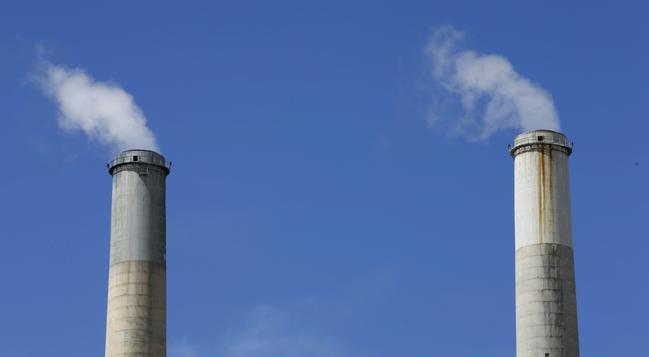Carbon cuts 'miles short' of 2030 goal: UN
Carbon cuts 'miles short' of 2030 goal: UN

Breaking News
Don't miss out on the headlines from Breaking News. Followed categories will be added to My News.
Greenhouse gas concentrations in the atmosphere reached new record highs in 2023, the UN warned on Monday, with countries falling "miles short" of what is needed to curb devastating global warming.
Levels of the three main greenhouse gases -- heat-trapping carbon dioxide, methane and nitrous oxide -- all increased yet again last year, said the World Meteorological Organization, the United Nation's weather and climate agency.
Emissions, largely from the burning of fossil fuels, have continued a relentless rise in recent years, even as rising temperatures unleash increasingly damaging and costly extreme weather across the globe.
A separate report by UN climate change found that barely a dent is being made in the 43 percent emissions cut needed by 2030 to avert the worst of global warming.
Action as it stands would only lead to a 2.6 percent reduction this decade from 2019 levels.
"Current national climate plans fall miles short of what's needed to stop global heating from crippling every economy, and wrecking billions of lives and livelihoods across every country," said UN climate chief Simon Stiell.
The two reports come just weeks before the United Nations COP29 climate summit in Azerbaijan, and as nations prepare to submit updated national climate plans in early 2025.
"Bolder" plans to slash the pollution that drives warming will now have to be drawn up, Stiell said, calling for the end of "the era of inadequacy".
- 'Trainwreck' -
Under the 2015 Paris Agreement, countries agreed to cap global warming at "well below" two degrees Celsius above average levels measured between 1850 and 1900 -- and 1.5C if possible.
But so far their actions have failed to meet that challenge.
Existing national commitments would see 51.5 billion tonnes of CO2 and its equivalent in other greenhouse gases emitted in 2030 -- levels that would "guarantee a human and economic trainwreck for every country, without exception," Stiell said.
Carbon dioxide was accumulating in the atmosphere "faster than at any time during human existence", up more than 10 percent in two decades, the WMO said. The current atmospheric CO2 level was 51 percent above that of the pre-industrial era.
As long as emissions continue, greenhouse gases will keep accumulating in the atmosphere, raising global temperatures, WMO said.
Last year temperatures on land and sea were the highest in records dating as far back as 1850, it added.
WMO chief Celeste Saulo said the world was "clearly off track" to meet the Paris Agreement goal, adding that record greenhouse gas concentrations "should set alarm bells ringing among decision-makers".
- Climate 'feedbacks' -
The last time the Earth experienced a comparable concentration of CO2 was three to five million years ago, when the temperature was 2-3C warmer and the sea level was 10 to 20 metres (65 feet) higher than now, it said.
Given how long CO2 lasts in the atmosphere, current temperature levels will continue for decades, even if emissions rapidly shrink to net zero.
Just under half of CO2 emissions remain in the atmosphere, while the rest are absorbed by the ocean and land ecosystems.
Climate change itself could soon "cause ecosystems to become larger sources of greenhouse gases", WMO deputy chief Ko Barrett warned.
"Wildfires could release more carbon emissions into the atmosphere, whilst the warmer ocean might absorb less CO2. Consequently, more CO2 could stay in the atmosphere to accelerate global warming.
"These climate feedbacks are critical concerns to human society."
In 2023, CO2 concentrations were at 420 parts per million (ppm), methane at 1,934 parts per billion, and nitrous oxide at 336 parts per billion.
CO2 accounts for about 64 percent of the warming effect on the climate.
Barret said much of the world's warming trajectory hinges on how fast the world can transition to a low fossil fuel economy.
"The question is to what degree will we see that manifest at COP29 in action," Barrett added.
tsz-np/klm/giv
Originally published as Carbon cuts 'miles short' of 2030 goal: UN


